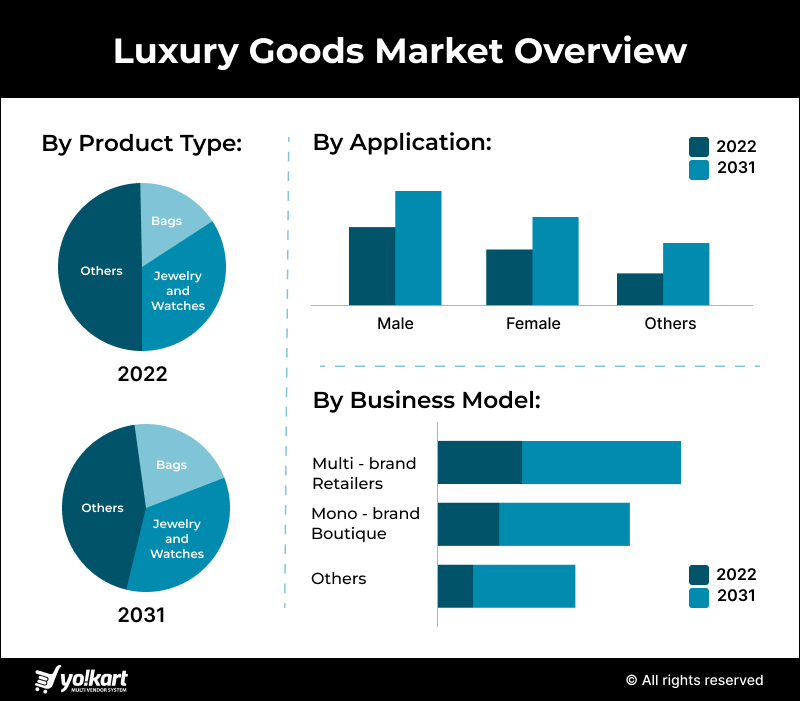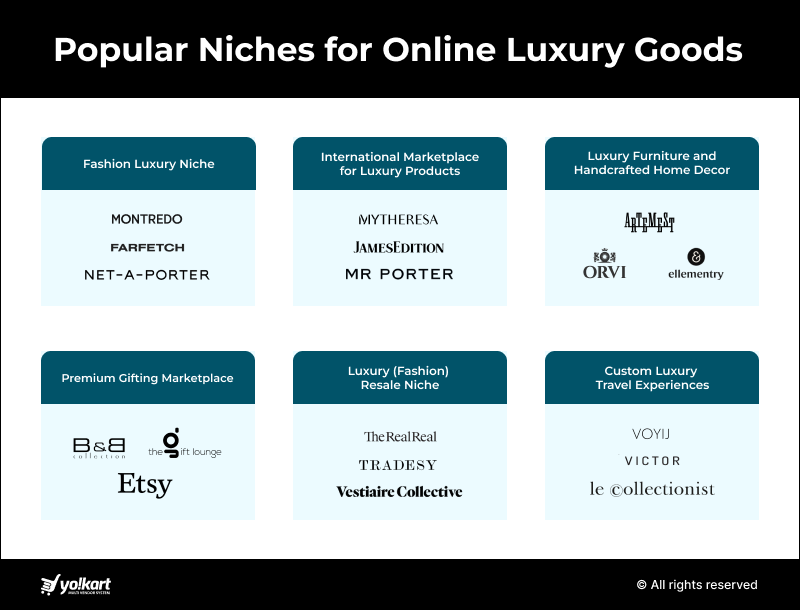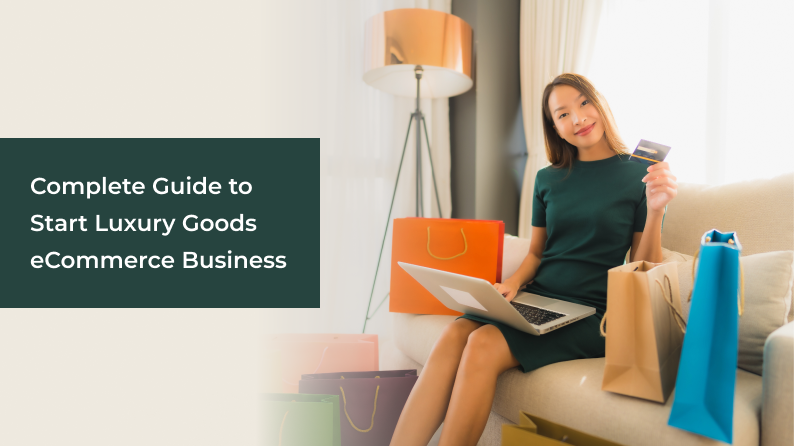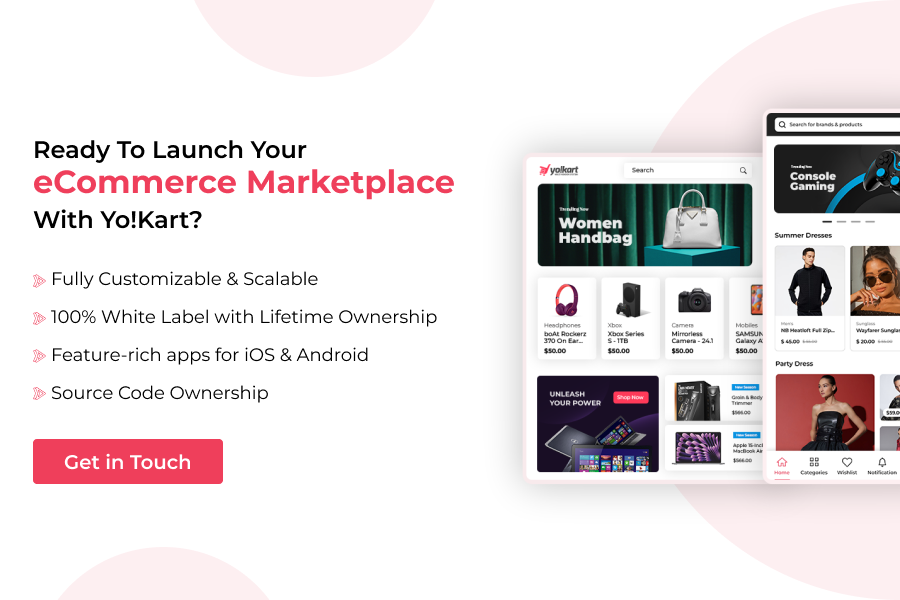Last Updated: 20 May, 2024
Traditionally, luxury brands have been curating the whole sales experience around their product in their offline retail outlets. For the consumer, buying the product has been an experience that extends beyond the utility of the product itself. Psychologically, associating themselves with the brands has been an integral part of the purchase process. For the brands, leveraging this white glove indulgence has been key to their brand strategy.
But times changed, retail evolved, and so did consumers’ shopping preferences. To reach all buyer groups, most luxury brands now prioritize engaging with their buyers via multiple platforms, albeit, through the same exclusivity. Today, it’s not a question of How? it’s more about How many? As these brands look to maximize consumer touchpoints, exciting opportunities for entrepreneurs emerge. In this blog, learn how to start an online business for luxury brands.
Read all about:
Luxury Goods Market Overview
Like most industries in the retail sector, the luxury eCommerce market received an injection of accelerated growth during the pandemic. In fact, according to ECDB, the market for luxury goods grew at a CAGR of 17% during the pandemic period of 2020 – 2022, as opposed to the market for non-luxury items which grew at 8% during this period. Since then the market has been growing steadily, and it is expected to grow at a CAGR of 7.1% till 2030. These are encouraging numbers.
In this growth, online channels are leading the charge. Currently, according to McKinsey, 60% of all buyers, head straight to an eCommerce website for buying luxury products. Moreover, according to another study, a similar 60% of the respondents were more inclined to buy Luxury Goods from dedicated exclusive websites. This sheds light on the buyers’ priorities. While the majority of them prioritize online channels, they prefer exclusive domains.

Furthermore, one of the key reasons for online growth of the luxury goods industry is the increased participation from Gen Z and millennials. Collectively they account for nearly half of the total numbers. eCommerce businesses. This is reflected in the regional growth, where South and South East Asian countries with younger populations leading the growth. Notably markets like Korea and India are maturing, while China is also picking up again. However, America (24%) and Europe continue to contribute significantly towards the industry.
Now, focusing on the supply side of the equation. Notably, Italy has the highest number of brands(40%) followed by the largest market in Europe, France. These countries are followed by the US, UK, and Germany. These were industry insights into where and for whom the luxury goods market is gaining traction. Moving ahead, let’s analyze what all makes up for this industry, and how popular players in the market are making use of this opportunity.
Get eCommerce features to operate in all major world regions
What makes up for the Luxury products industry?
Why do you feel luxury products are called such? Is it the aesthetic appeal, high quality, promise of longevity, exclusivity, or just the brand appeal? Chances are most products that are perceived as luxury goods may not have all of these virtues, but surely some of these. If you try to ask these questions to a buyer as to why they just bought a luxury product, at times, it is just the high price that has motivated them.
In essence, the charm of luxury products lies in their ability to evoke a sense of exclusivity and emotional fulfillment. Whether it’s the meticulously handcrafted details of custom furniture, the timeless elegance of expensive jewelry like diamond rings, or the appeal of a branded fashion accessory, each item represents an embodiment of refined taste and individuality. Moreover, in certain scenarios, the value of some luxury goods appreciates over time, offering a good investment option. Let’s see which luxury eCommerce product categories that have been doing well:
- High-end Fashion products such as apparel, shoes, sunglasses, and watches.
- Branded Leather products like designer bags and wallets,
- Jewelry that majorly includes diamonds and other precious stones. Also crafted metal.
- Cosmetics and Fragrances.
- Premium Home Decor that can include exquisite furniture, luxury soft furnishing, crystal & porcelain, handwoven carpets, and even kitchenware.
- Premium Stationery that includes products from popular labels such as Montblanc, Cerruti, DuPont, and others.
- Bespoke services that offer detailed, personalized, and high levels of craftsmanship. For instance custom tailoring.
- Fine Art, antiques and other collectibles.
- Non-mainstream products such as cigars, wines, heritage firearms, and more.
- Mobility including luxury cars, Yachts, personal jets, and more.
These are some of the luxury eCommerce product categories that have been offered by the top players in the online luxury goods market. Let’s have a look at the top players and popular niches that they operate in.
Popular niches for online luxury goods
Niche eCommerce businesses are online platforms that operate on a specific theme. As a business strategy, this is often adopted to position the business effectively in a competitive market. By doing so, you are catering to the requirements of a defined audience, resulting in a business with a focused value proposition. This is the reason why many eCommerce businesses succeed with such a strategy. Let’s discuss some popular niches for online luxury goods.

Fashion Luxury Niche
An online fashion platform for luxury goods is one of the most popular luxury niches. These marketplaces are popular because fashion products and accessories are universally loved, brands are well-known, and procurement channels are easily available. Moreover, some of the leading fashion luxury platforms go beyond just being a luxury fashion platform. They cater exclusively to specific genders, for instance, online fashion eCommerce for women. Still, because of the popularity, competition can be there in some of the congested world markets.
Popular player: NET-A-PORTER
Based in: London, UK
Product categories on offer: Fashion apparel and accessories, jewelry, bags, and more.
Start a Luxury Products Online Fashion Marketplace
International Marketplace for Luxury Products
There is a global demand for Made in Italy/France luxury products, especially from leading markets like the US. Leveraging the dynamic logistics of today, online businesses that bridge this demand and supply can tap into a lucrative opportunity.
Popular player: Italist
Based in: Los Angeles, US
Product categories on offer: Fashion apparel and accessories, shoes, jewelry, bags, homewares, and more.
Luxury Furniture and Handcrafted Home Decor
This is a luxury online business niche for exclusive furniture, hand-crafted premium home decor products, and similar products. For this niche as well, craftsmanship sourced from European countries like Italy; or from the Orient like China or India has demand in Western countries like the US, Australia, and UK.
Popular Player: Artemest
Based In: Milan, Italy
Product categories on offer: Handcrafted furniture, Lighting, and Home Decor.
Luxury Accessories Niche (Premium Gifts Marketplace)
Businesses focused on offering luxury accessories have a very specific and defined audience. These cater to exclusive experiences for the buyers. Additionally, these can also become a favored destination for buyers to find the best gifts.
Popular player: B&B Collection
Based in: Romania, Europe
Product categories on offer: Jewelry, watches, cosmetics, writing instruments (stationery), lighters, pen knives, and more.
Luxury (Fashion) Resale Niche
Gen Z takes up a sizable portion of the luxury market buyers. These are also buyers that are now more aware of the impending climate crisis. Hence there is an increased preference for sustainable life choices. Because of this, luxury items resale is gaining traction. Such online businesses are primarily focused on fashion and accessories product categories at present times.
Popular player: Vestiaire Collective
Based in: New York, US
Product categories on offer: Jewelry, apparel, accessories, vintage products, and more.
Custom Luxury Travel Experiences
Beyond just physical products, online businesses also cater to luxury experiences. This can include personalized travel concierge services and other exclusive experiences designed to fulfill the needs of the most discerning clientele.
Popular player: Voyij
Based in: Alaska, US
Product categories on offer: Custom activities and local memorabilia.
Rare Collectibles Luxury Niche (Online Auction Marketplaces)
For collectors, the internet is a good source to wind their passion. Collectibles can be vintage luxury accessories, limited edition art pieces, rare wines and spirits, or even antique firearms. Such collectibles are often unique and exclusive ― available in limited quantities. Generally, such items are sold via online auctions, hosted on the website platforms.
Popular player: Heritage Auctions
Based in: Texas, US
Product categories on offer: Artifacts, historical, wine, fashion, and more.
Luxury Lifestyle Niche
Giving the elite buyer a one-stop shop to source all their needs for an exclusive and luxurious lifestyle can be an attractive proposition. Such online marketplaces can be anything between being active intermediaries i.e. playing an active role in procuring and buying, passive middlemen: by just providing the platform for third-party vendors to sell to the buyers, or lastly just a classified listing platform.
Popular player: James Edition
Based in: Amsterdam, Netherlands
Product categories on offer: Real Estate in exotic locations, supercars and luxury cars, yachts, jets.
M2C Luxury Marketplace (Manufacturers to Consumers)
As mentioned, brand identity is a significant motivation to buyers of this industry, but it certainly doesn’t account for all purchases in it. For many consumers, the quality and longevity of the product is one the key reasons they want to purchase a luxury product. For consumers such as these, online marketplaces that bridge manufacturers who can produce quality products that match their branded counterparts ― directly with consumers, are a good destination to shop for their needs.
Popular player: Italic (More of an aggregator, but the business model is M2C)
Based in: California, US
Product categories on offer: fashion, jewelry, soft furnishing, and more.
These are some of the niches that popular players in the market have successfully adopted. These are also business ideas for aspiring entrepreneurs. They can use these as inspiration or as a starting point to spark a new disruptive business idea. On the same note, let’s have a look at some business ideas that are catching up, but have not been taken up by any major player ― so far.
Future Priorities For Online Luxury Goods Industry
Having grown up with iPads and all around them, the younger generation is more inclined towards technology. According to a study by Bain & Co, 75% of buyers for luxury products have a predilection for technology. Hence brands are bridging the gap between luxury and technology to give rise to new niches within the luxury products industry.
For instance, some leading designer labels like Louis Vuitton, Breitling, and Tag Heuer have released a smartwatch range. Then there are brands like Caviar (caviar.global) that provide custom tech products using combinations of materials like diamond, gold, carbon, jewelry enamel, and even meteorites. However, a truly contemporary shift is the use of Web 3 technologies. The 160-year-old brand Louis Vuitton leads this new chapter by launching its own game and NFTs for the metaverse.
Apart from tech, sustainability is a major consideration for buyers. As mentioned, fashion resale caters to this need. Another such trend in the circular economy is luxury product restoration. This is for products such as leather bags, shoes, and more. Hermes has been offering this for a long time. Some others like Bottega Veneta have also joined in. Additionally, popular luxury marketplaces like Farfetch have offered this service via a third party partnership with Restory (currently suspended). Likewise, businesses like thecobblers offer comprehensive restoration services as well.
Luxury eCommerce Website: Tips to Consider
An online business for luxury goods aims to replicate the same offline experience for consumers on the online platform. Moreover, with eCommerce, there are fundamental necessities for all those who participate in the business. Let’s see which are the quintessential requirements you would need in your eCommerce website for luxury products:
Engaging Shopping Experience
To engage users with the same white glove treatment that they get in offline luxury stores, the eCommerce website needs to offer an intuitive and seamless UX (user experience). The user interface needs a unified design language that echoes a similar indulgence ― that the consumers are used to in a brick and mortar luxury store.
Refined Product Presentation
Luxury brands sell products beyond their utility. They are selling an experience. To be able to communicate this experience effectively, they need to give out product information with attention to detail. This would come from high-quality images, videos, detailed product descriptions, downloadable certifications for jewelry/manuals for furniture, and other information that aids buyers in discerning the product with content.
Secure Ecosystem
In eCommerce security is a key concern. With user data and financial transactions in the mix, the user needs assurance of a robust ecosystem. Hence the eCommerce website needs to conform to industry standard security requirements. On the other hand, transactions are securely carried out by robust payment gateways.
Efficient Selling Environment
The more effectively sellers will be able to sell their products on the platform, the higher the chances for more revenue for the business, and eventually success. To facilitate this, an important consideration is giving sellers exclusivity. This can be done by allowing them to build a microsite within the platform. Next, they can be provided with dedicated tools for more operational flexibility.
Seamless Operations
As an intermediary in your eCommerce business, you have the role to facilitate the backend operations and manage the infrastructure. To carry out these objectives efficiently, key requirements will be seamless operational workflows to maximize efficiency, rich features to manage each aspect of your eCommerce undertaking, and integrated third party facilitators like shipping, taxing, and accounting solutions.
Flexibility
If you have observed from the business ideas section, there are multiple ways you can shape your business. Even if you have a solid plan at the beginning, but after getting the business out in the market, the viability of the plan will be best evaluated from user feedback, acquired from the early adopters. After this, you may need to add or pivot. For this reason, it is important to have your options open by building a flexible platform ― one that can be personalized at later stages in the business.
Long Term Solution
The luxury industry is trust-driven, and users’ trust in the business is fostered by effective branding. To achieve this, your key considerations will be a robust platform that you can rely on for your business, both now and in due course of your business. Along with it a team to partner with. Last but not least, for effective branding, you need marketing channels that allow you to build communication with your target users.
These were some of the requirements that should be on your must-have list for a successful online eCommerce luxury business. With these, what should be your next step? Search for an eCommerce development company, and share these requirements? Hold your horses, there is an alternate approach, one that is faster, more cost-efficient, and naturally, more popularly adopted.
How to build your eCommerce business website for Luxury Goods
Today, entrepreneurs looking to start an eCommerce business turn to turnkey eCommerce solutions. These are readymade solutions that give entrepreneurs an easy way to get started with their business plan. These come in a variety of options, and depending upon the solution you opt for, starting is as easy as installing the solution. No coding will be required. These solutions have an in-built CMS and other tools for ease of operations.
Get a complete turnkey solution to start your eCommerce journey
Wrapping up
A growing luxury market means that retailers and brands are vying for new opportunities to reach buyers. Luxury eCommerce marketplaces give these brands a much-needed bridge to connect with their target consumer base. Entrepreneurs/businesses around the world have been entering the market with their eCommerce platforms in multiple ways.
With steady demand in the west and increased participation from emerging markets in Asia, aspiring eCommerce entrepreneurs can study how to start a luxury goods marketplace, in the region they want to target, with a product line up they find most opportune and a business model that suits best for the online luxury business. After the business opportunity has been identified, they have the capability to move swiftly to capture the market with a turnkey solution built for luxury eCommerce.
FAQ
Q1. What are the top luxury eCommerce product categories?
Ans: The best-performing luxury eCommerce product categories are as follows:
– High-end Fashion products.
– Branded Leather products.
– Jewelry.
– Cosmetics and Fragrances.
– Premium Home Decor.
– Premium custom services.
– Fine Art and other collectibles.
Q2. What is a good niche market for luxury products?
Ans: There are multiple niches within this industry. Traditionally, entrepreneurs have leveraged fashion and accessories as a product category of luxury goods and started an online business in multiple ways. For instance, fashion retail, fashion resale, international fashion trade, manufacturer-to-consumer, and others. Adding homewares including furniture broadens the scope. While some businesses have gone the online auction route to sell collectibles. The best suited niche for your business will depend on the market demand, existing competitive scenario, investment capital available to you, and other such factors.
Q3. Which is the best luxury goods eCommerce software?
Ans: YoKart is a leading turnkey multi vendor solution for luxury goods. It comes with essential eCommerce features, premium UI/UX, logic-driven workflows, seamless navigation, and multiple business APIs pre-integrated. Moreover, the solution is self-hosted and extensively customizable. YoKart is also inherently secure and meets all international security standards. It has been built to cover multiple use cases, however, for specific business needs there is support available from the in-house team. Moreover, you can own this solution for a lifetime with prices starting as low as $499.




